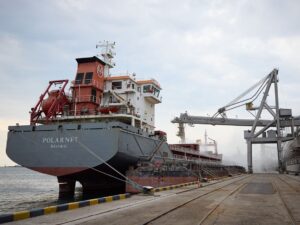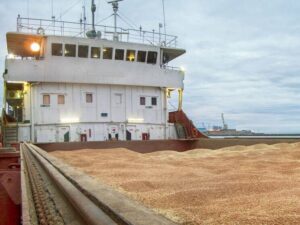Number of unemployed in Ukraine and job opportunities, Jan 21 – June 22


The Ministry of Infrastructure announced the departure of the first ship with 26,000 tons of Ukrainian corn from the sea trade port “Odessa”.
“The first ship with Ukrainian food left the port of Odessa,” Minister of Infrastructure of Ukraine Oleksandr Kubrakov wrote on his Facebook page.
Earlier, People’s Deputy of Ukraine (European Solidarity faction) Oleksiy Goncharenko in his telegram channel said that the first caravan of 16 dry cargo ships with grain from Ukraine would arrive in Turkey on August 3 this year.
As reported, on July 29, the ambassadors of the G7 countries in Ukraine arrived in Odessa to check the launch of the “grain corridor”.
On July 22, under the auspices of the UN, Ukraine and Turkey signed an agreement in Istanbul on the resumption of the safe export of Ukrainian grain across the Black Sea.
On the morning of July 23, Russian invaders attacked the Odessa Commercial Sea Port with Caliber cruise missiles. The Ukrainian Foreign Ministry said that the Russian Federation, with a missile attack on the port, questioned the agreements it had given to the UN and Turkey in the “grain” agreement. The UN chief unequivocally condemned reports of air strikes on Odessa, citing the commitments made by the parties at the signing ceremony in Istanbul.

The authorities of the capital of Poland have awarded the mayor of Kyiv, Vitali Klitschko, the title of honorary citizen of Warsaw, the Kyiv city state administration reported.
The ceremony took place at a solemn meeting of the Warsaw City Council, which takes place every year on July 31, the day of the Warsaw Uprising, according to the press service on the City Hall website.
The mayor of Kyiv recorded a video message to his Polish colleagues and friends and thanked them for their help and support. He noted that Ukrainians today are defending not only their independence and European choice, but also democracy, stability and security of all of Europe.
In turn, Warsaw Mayor Rafal Trzaskowski stressed that Poland would continue to help Ukraine. And both countries will remain free and independent states. “We are with you and you can always count on us!”, – stressed the mayor of the Polish capital.

The Verkhovna Rada adopted as a basis the European integration bill No. 6480, which implements the provisions of EU Regulation No. 2019/787 in the field of geographical indications of alcoholic beverages and the production of alcoholic beverages according to EU standards into Ukrainian legislation.
The corresponding bill, submitted by the Cabinet of Ministers of Ukraine, was adopted at a parliament meeting on Friday by the votes of 266 people’s deputies (with the minimum required 226), Taras Melnichuk, representative of the Cabinet of Ministers in the Verkhovna Rada, said.
“This bill establishes general rules for the definition, description, presentation and labeling of alcoholic beverages, the rules for using the official names of alcoholic beverages; defines the features of the use and protection of geographical indications of alcoholic beverages; introduces a system for controlling geographical indications of alcoholic beverages,” the deputy wrote in his Telegram channel.
According to the text of the document, Ukrainian alcoholic beverages with geographical indications have significant potential in the European market, however, their sale and legal protection in the EU is possible only after successful state registration in Ukraine, the procedure for which currently does not exist due to the absence of the concept of legal protection of geographical indications of spirits.
To solve this problem, bill No. 6480 legislates the concept of “alcoholic beverage” and establishes a unified classification list of categories of alcoholic beverages and requirements for them; introduces requirements for ethyl alcohol and distillates used for the production of alcoholic beverages; ensures compliance with the rules for the definition, description, presentation and labeling of alcoholic beverages, including alcoholic beverages with geographical indications; ensures compliance with the requirements for the official names of alcoholic beverages.
“The implementation of the law will have a positive impact on the market environment, the state – by ensuring that Ukraine fulfills its obligations under the Association Agreement by bringing national legislation closer to the EU acquis in the field of legal protection of geographical indications; consumers – by ensuring transparency and fair competition in the alcohol market and providing information on alcoholic beverages,” is indicated in the explanatory note to the document.

Turkish presidential spokesman Ibrahim Kalin said on Sunday that the first ship with grain on board could leave the Black Sea ports of Ukraine on Monday.
“Negotiations are ongoing. There is a possibility that the first ship will set off tomorrow morning,” Turkish TV channel TRT Haber quotes him as saying.
In Istanbul on July 22, with the participation of the UN, Russia, Turkey and Ukraine, two documents were signed on the creation of a corridor for the export of grain from three Black Sea ports – Chernomorsk, Odessa and Yuzhny.

At a session at the end of this week, the Transcarpathian Regional Council decided to increase the authorized capital of the Uzhgorod airport located near the border with the EU by UAH 26 million in order to resume its work without waiting for the end of the war.
“We have significantly raised the funding of the Uzhgorod airport … in order to carry out the necessary procedures, obtain permits, build the necessary buildings and, finally, start earning, and not count losses,” Volodymyr Chubirko, head of the Transcarpathian Regional Council, wrote on Facebook.
“The former minus – the runway, which starts abroad, has become its plus. We must use it,” he said.
The international airport “Uzhgorod” is located in a mountainous area in such a way that the threshold of the runway 10 is located a few hundred meters from the Ukrainian-Slovak border. Therefore, Slovak airspace is used for instrument landings at this aerodrome.
In September 2020, Ukraine and Slovakia signed an intergovernmental agreement, and a year later, the airport accepted the first flight using a certain part of the Slovak airspace.
Local media also report Chubirko’s words, who expressed confidence that the airport will be launched “in a month or two”, and Ukrainian companies based in Europe today will use it.